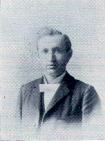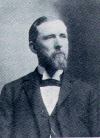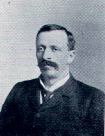maining there until 1889, when he cast his lot amid the commercial tides of the city of Omaha. It is said that he was the youngest candidate ever admitted to practice law in any court of record in the United States. He began the practice when fifteen years old, being regularly admitted two years later. He is the author of a book entitled "Labor as Money," and has frequently written for the Arena and other publications of note. Although not a graduate of any college, he is possessed of a liberal education, acquired by private devotion to study, self-improvement, and a wide range of reading. He was married February 5, 1889, to Miss Hettie Skeen at Red Cloud, Nebraska, and they have one child, an interesting little son. Mr. Yeiser has written and will soon publish a work under the suggestive, and to some people, startling title of "The Abolition of Both Public and Private Property in Land and Occupancy Rights." He was elected on the fusion ticket, but the certificate was delivered to his opponent, and he secured his seat in the house after a protracted contest. He is a member of the committees on judiciary, militia, and constitutional amendments.
|
HON. THOMAS T. YOUNG.
|
vass. There were five candidates before the nominating convention, but Mr. Young received 1155 out of a total of 201 votes. Representative Young and his wife are both members of the Methodist Episcopal church. His committees are railroads, revenue and taxation, and public schools. HON. DAVID S. ZIMMERMAN.
|
market, and made a pronounced success at hog and cattle feeding. He succeeded by his far-sighted business methods. He joined the Alliance movement at its inception, and appointed as vice president the two men who co-operated with the Knights of Labor to form the independent party in York county. In 1891 Mr. Zimmerman was elected county treasurer of York county, and was re-elected in 1893. He is chairman of the committee on railroads, and a member of the committees on finance, ways and means, and public lands and buildings.

|

|
 |
 |
 |
© 1999, 2000, 2001 for NEGenWeb Project by Geil Wiggins, Ted & Carole Miller


